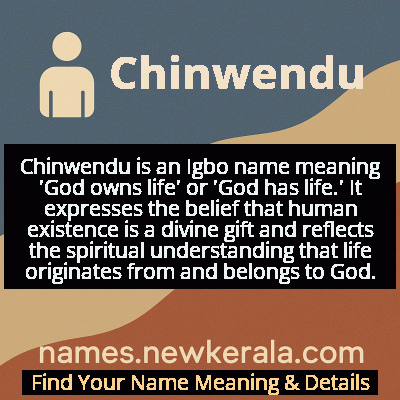Chinwendu Name Meaning & Details
Origin, Popularity, Numerology Analysis & Name Meaning of Chinwendu
Discover the origin, meaning, and cultural significance of the name CHINWENDU. Delve into its historical roots and explore the lasting impact it has had on communities and traditions.
Name
Chinwendu
Gender
Male
Origin
Unknown
Lucky Number
2
Meaning of the Name - Chinwendu
Chinwendu is an Igbo name meaning 'God owns life' or 'God has life.' It expresses the belief that human existence is a divine gift and reflects the spiritual understanding that life originates from and belongs to God.
Chinwendu - Complete Numerology Analysis
Your Numerology Number
Based on Pythagorean Numerology System
Ruling Planet
Moon
Positive Nature
Diplomatic, friendly, artistic, empathetic.
Negative Traits
Over-sensitive, moody, indecisive, prone to self-pity.
Lucky Colours
Green, cream, white.
Lucky Days
Monday.
Lucky Stones
Pearl, moonstone.
Harmony Numbers
1, 3, 4.
Best Suited Professions
Diplomats, mediators, caregivers, artists.
What People Like About You
Cooperative spirit, friendliness, artistic talent.
Famous People Named Chinwendu
Chinwendu Nwokoye
Footballer
Professional Nigerian footballer with national and international club experience
Chinwendu Ihezuo
Footballer
Nigerian female international footballer and sports ambassador
Chinwendu Bernard
Business Executive
Technology entrepreneur and business leader in Nigeria's growing tech sector
Name Variations & International Equivalents
Click on blue names to explore their detailed meanings. Gray names with will be available soon.
Cultural & Historical Significance
Extended Personality Analysis
People named Chinwendu often develop personality traits that reflect the name's spiritual depth and cultural weight. They tend to be introspective individuals with a strong moral compass and deep appreciation for life's sacred dimensions. Many exhibit natural wisdom beyond their years, often serving as counselors or peacemakers in their communities. Their understanding of life as a divine gift typically makes them resilient in adversity, viewing challenges as part of a larger spiritual journey rather than mere misfortunes. Chinwendus are frequently characterized by their balanced approach to tradition and progress - they honor cultural heritage while being open to innovation and change. In social settings, they often demonstrate exceptional empathy and emotional intelligence, making them valued friends and trusted confidants. The name's meaning tends to cultivate a sense of purpose and responsibility, with many bearers feeling called to make meaningful contributions to their communities and society at large. Their spiritual orientation doesn't necessarily mean religious dogmatism but rather a profound awareness of life's interconnectedness and deeper meanings.
Modern Usage & Popularity
In contemporary society, Chinwendu maintains its cultural relevance while adapting to modern contexts. The name continues to be popular among Igbo families in Nigeria and the diaspora, though its usage patterns have evolved with globalization. Urban professionals often choose the name to maintain cultural connections while living in multicultural environments. Interestingly, the name has seen increased usage among second and third-generation immigrants as a way to preserve cultural identity. Modern technology and social media have also increased the name's visibility beyond traditional Igbo communities. While the full name Chinwendu remains preferred for official purposes, many bearers use shortened versions like 'Chinwe' or 'Wendu' in casual settings. The name's deep meaning and cultural richness have helped it maintain popularity despite the trend toward more Westernized names in some urban African communities. Recent years have seen a resurgence of traditional African names as cultural pride movements gain momentum globally.
Symbolic & Spiritual Meanings
Symbolically, Chinwendu represents the fundamental truth that life is a sacred trust rather than a personal possession. The name serves as a metaphysical reminder that human existence is interconnected with divine will and purpose. Metaphorically, it suggests that each life has inherent value and meaning beyond material circumstances or personal achievements. The name embodies the concept of stewardship - that we are caretakers rather than owners of our lives, with responsibilities toward ourselves, our communities, and future generations. In philosophical terms, Chinwendu symbolizes the balance between human agency and divine sovereignty, encouraging both active engagement with life and humble recognition of larger forces at work. The name also carries symbolic weight as a cultural artifact, representing the endurance of African spiritual wisdom in a rapidly changing world and serving as a bridge between ancestral traditions and contemporary realities.

